The ninth month of the Islamic lunar calendar is the holy month of Ramadan, which began for Muslims worldwide on March 10. During this month, Muslims abstain from eating and drinking during the day, an act of penance that teaches self-control, reinforces one’s faith and helps one become more mindful of God.
There are about 60,000 Muslims in Taiwan, many of them migrant laborers or students from Southeast Asia, the Middle East or Africa. Some too, are Taiwanese.
Yahya, a 29-year-old civil engineer, has spent 10 years living in Taiwan. He is an Iraqi who initially traveled to the US to study Mandarin Chinese and where he later obtained his engineering degree.
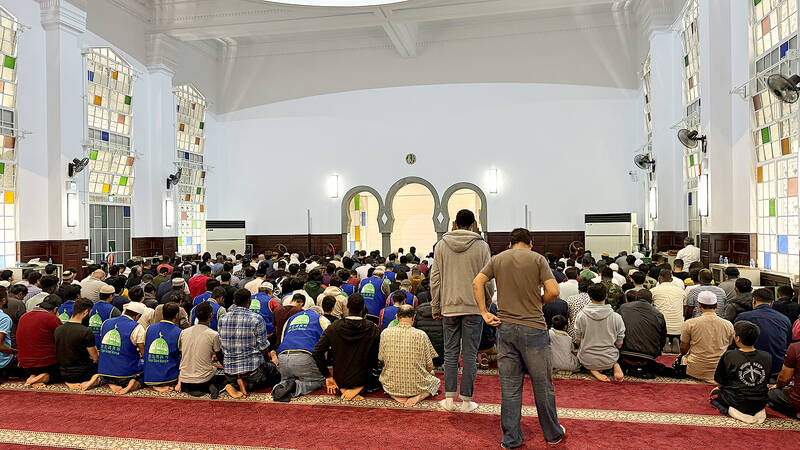
Photo: Bing Wang
Getting used to his new environment was challenging because he knew little about Taiwan before he arrived. Luckily, he discovered a supportive group at the Taipei Grand Mosque, where he now regularly attends prayers and helps out whenever he has free time.
TAIWAN’S LARGEST MOSQUE
After the Chinese Civil War, many Chinese Muslims migrated to Taiwan with the Chinese Nationalist Party (KMT) in 1949. They lobbied high-ranking KMT officials to construct a mosque because they needed a place of prayer. The building was finished in April, 1960 with assistance from the government, a loan from the Bank of Taiwan and donations from Jordan and Iran. In 1999, the government of Taipei City recognized the mosque as a historic site.
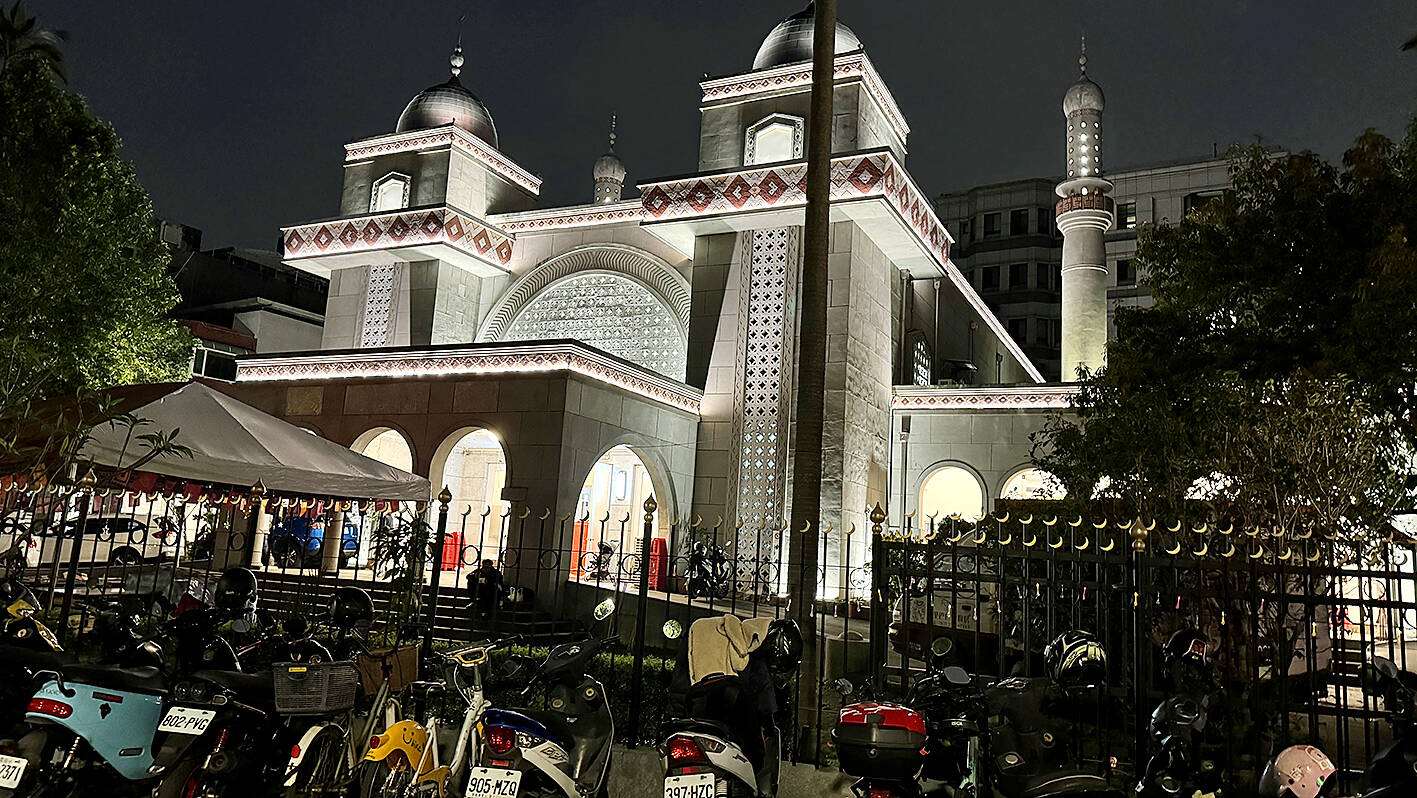
Photo: Bing Wang
Every Friday afternoon, prayers are held in the Taipei Grand Mosque (台北清真寺), and hundreds of Muslims attend. The mosque also hosts daily Suhoor and Iftar meals before sunrise and sunset during the holy Islamic month of Ramadan.
Yaser Cheng (鄭泰祥), the mosque’s chairman, says nearly 600 people from 25–30 nations come for the Iftar meal every night. For example, Shaheen, a Somali graduate student at National Taiwan Ocean University in Keelung, often travels an hour to get to the Taipei Grand Mosque.
During Ramadan, Yahya is one of many who donate their time at the mosque to set up tables and chairs, serve food and clean up after meals. He says, “The mosque has done a fantastic job of creating a sense of community here.”
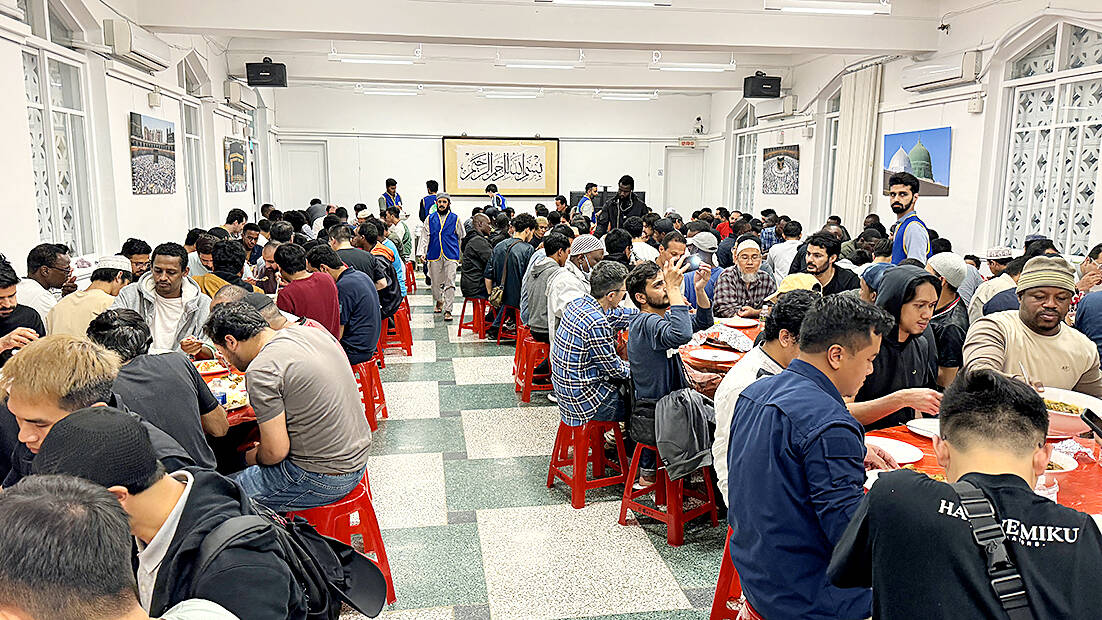
Photo: Bing Wang
The mosque offers weekly classes for Muslim children as well as online resources — the official website details the locations of Halal restaurants, and lists places where Muslims are specifically allowed to worship.
However, Islamophobia is not absent from Taiwan. Patu, an Indonesian migrant construction worker, says his wife often gets stares from Taiwanese because she wears a hijab. He recounts a time overhearing people saying she might have a bomb hidden underneath it.
Just last month, Minister of Labor Hsu Ming-chun (許銘春) made comments that were deemed racist, asserting Taiwan should attract migrant workers from northeastern India because “their skin color and dietary habits are closer to [Taiwanese]” as they are mostly “Christians.” Muslims actually account for 14 percent of India’s population, compared with just 2.3 percent of the population that subscribe to Christianity. The minister faced criticism for the remarks and issued an apology days after.
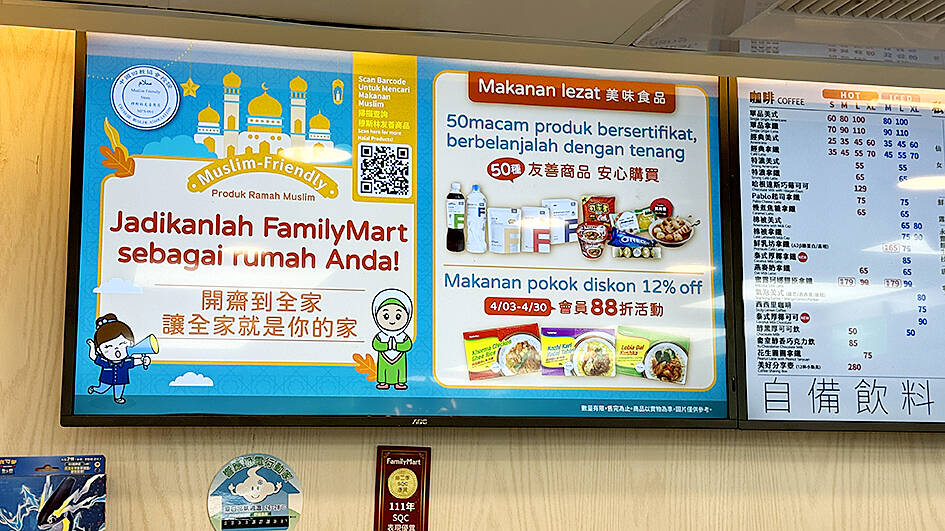
Photo: Bing Wang
TOLERANCE IN TAIPEI
Notwithstanding some episodes of xenophobia, Imam Ibrahim Chao (趙錫麟) of the Taipei Grand Mosque believes Muslims all over the world praise Taiwan. He says Taiwan has, for the most part, done a good job of giving Muslims a secure environment to practice their faith.
In 2022, The Halal in Travel Awards (HIT) named Taiwan the most Muslim-inclusive destination for a non-Organization of Islamic Cooperation (OIC) country. The 2023 Global Muslim Travel Index ranked Taiwan the third-most Muslim-friendly non-OIC destination. Taiwan’s capital Taipei won the “Most Promising Muslim-friendly City Destination of the Year (non-OIC)” award in the same Index.
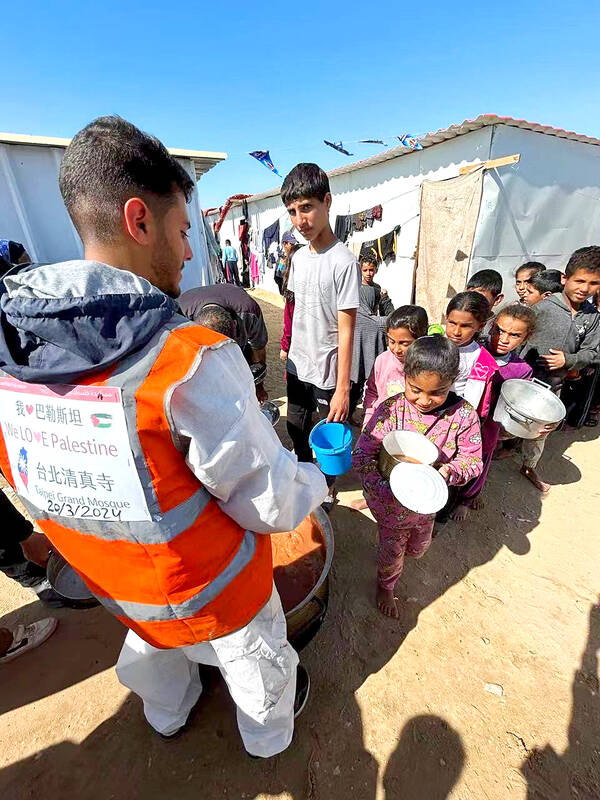
Photo Courtesy of Taipei Grand Mosque
The Taipei Grand Mosque frequently organizes fundraisers for Muslims facing humanitarian disasters worldwide. The mosque offered prayers for the earthquake victims and gave tens of thousands of dollars to those in need when a 7.8-magnitude earthquake hit Turkey and Syria in February last year, killing 50,000 people. A market has been organized on its front lawn, selling food and other items to collect money for Palestinians during the ongoing humanitarian crisis in Gaza, where millions of people are currently facing famine.
Donations were sent to non-governmental organizations, where they were used to purchase food, medical supplies and pay for other needs.
Yahya, who helped to arrange the fundraising campaign, says that these fundraising events help bring Taiwan’s Muslim community together. They inform Muslims that in addition to praying, they are here to support their Muslim friends worldwide.
“It’s great that the mosque is attempting to find more ways to introduce the Muslim community to Taiwanese people,” he says.

The canonical shot of an East Asian city is a night skyline studded with towering apartment and office buildings, bright with neon and plastic signage, a landscape of energy and modernity. Another classic image is the same city seen from above, in which identical apartment towers march across the city, spilling out over nearby geography, like stylized soldiers colonizing new territory in a board game. Densely populated dynamic conurbations of money, technological innovation and convenience, it is hard to see the cities of East Asia as what they truly are: necropolises. Why is this? The East Asian development model, with

This is a deeply unsettling period in Taiwan. Uncertainties are everywhere while everyone waits for a small army of other shoes to drop on nearly every front. During challenging times, interesting political changes can happen, yet all three major political parties are beset with scandals, strife and self-inflicted wounds. As the ruling party, the Democratic Progressive Party (DPP) is held accountable for not only the challenges to the party, but also the nation. Taiwan is geopolitically and economically under threat. Domestically, the administration is under siege by the opposition-controlled legislature and growing discontent with what opponents characterize as arrogant, autocratic

June 16 to June 22 The following flyer appeared on the streets of Hsinchu on June 12, 1895: “Taipei has already fallen to the Japanese barbarians, who have brought great misery to our land and people. We heard that the Japanese occupiers will tax our gardens, our houses, our bodies, and even our chickens, dogs, cows and pigs. They wear their hair wild, carve their teeth, tattoo their foreheads, wear strange clothes and speak a strange language. How can we be ruled by such people?” Posted by civilian militia leader Wu Tang-hsing (吳湯興), it was a call to arms to retake

When Lisa, 20, laces into her ultra-high heels for her shift at a strip club in Ukraine’s Kharkiv, she knows that aside from dancing, she will have to comfort traumatized soldiers. Since Russia’s 2022 invasion, exhausted troops are the main clientele of the Flash Dancers club in the center of the northeastern city, just 20 kilometers from Russian forces. For some customers, it provides an “escape” from the war, said Valerya Zavatska — a 25-year-old law graduate who runs the club with her mother, an ex-dancer. But many are not there just for the show. They “want to talk about what hurts,” she